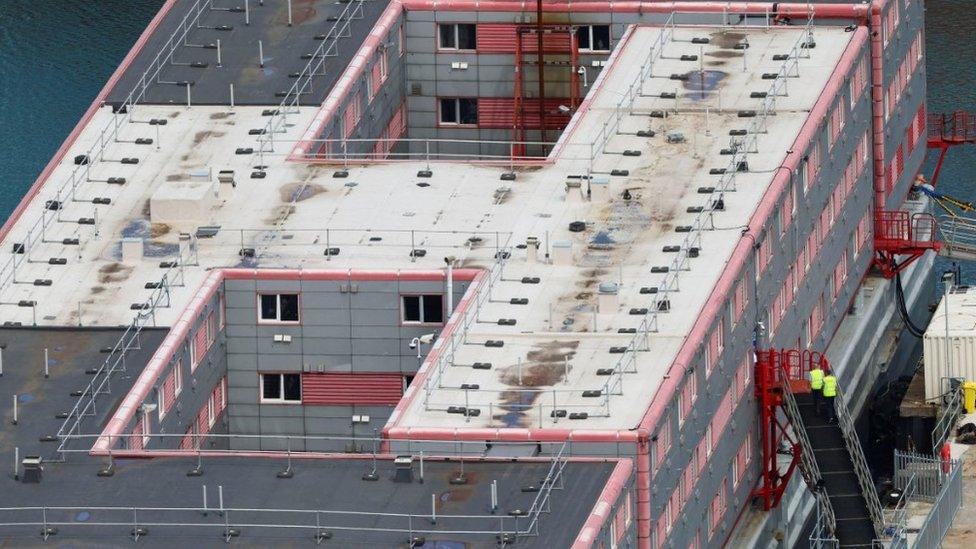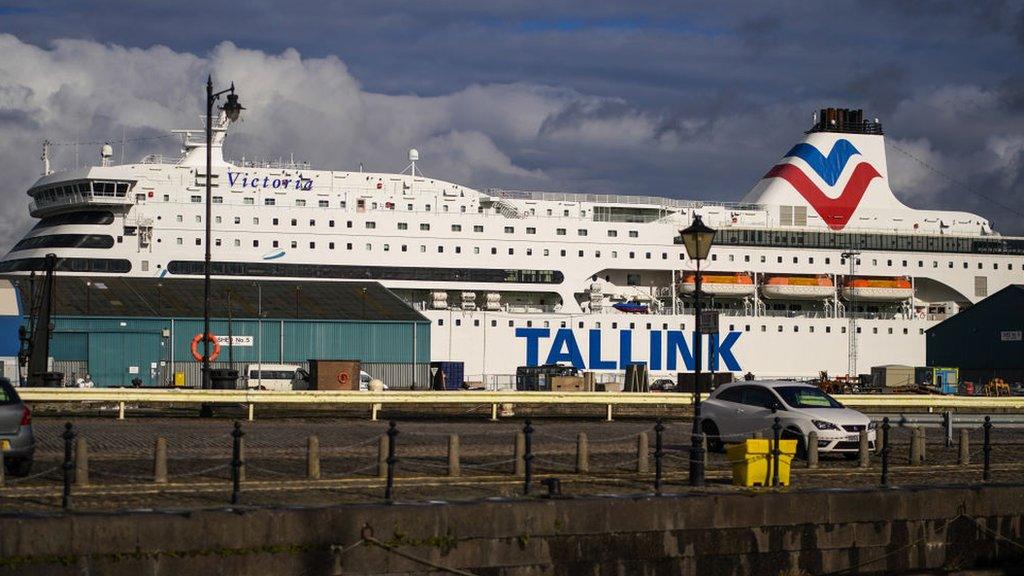Glasgow City Council reject asylum seeker barge request
- Published

Glasgow City Council leader Susan Aitken said she would not give consent to a barge for asylum seekers on the River Clyde
Glasgow City Council has rejected a request from the UK government to dock a barge for asylum seekers in the city.
The first group of asylum seekers began boarding the controversial Bibby Stockholm housing barge in Dorset on Monday.
But council leader Susan Aitken said Glasgow had refused to give permission for a similar proposal.
The Home Office said it would engage with local authorities whenever sites are used for asylum accommodation.
A spokeswoman said the government was obliged to house asylum seekers while their claim was considered, and it was committed to reducing hotel use.
In a tweet, external, Ms Aitken said: "The UK government wants [Glasgow City Council] to give consent to an asylum barge being sited in the city. We will not give it.
"Glasgow's communities are proud to be beacons of support and integration for asylum seekers and refugees. This is the polar opposite of that."
A city council spokesman said: "The council was made aware that agents working on behalf of the Home Office were exploring a potential site for a barge within Glasgow.
"The council has made it clear to the Home Office that it does not support such a move."
Bibby Stockholm is the flagship of the government's latest plan to "stop the boats" and deter dangerous Channel crossings by migrants.

Up to 500 men will eventually live on the Bibby Stockholm vessel
Up to 500 men aged between 18 and 65 will eventually live on the vessel while they await the outcome of asylum applications.
Some human rights groups have said housing people on board the barge is "inhumane", but UK government ministers insist the boat is safe and will be cheaper than using hotels.
The Home Office said it would be wrong to describe the barge as a "prison" as people living onboard are free to come and go.
In June, Edinburgh's council leader Cammy Day warned that the Home Office's plans to commission the MS Victoria in Leith to house asylum seekers could turn it into a "floating prison".
The ship was used as temporary accommodation for more than 1,000 Ukrainian refugees between July 2022 and July 2023.
Mr Day said the the council learned of the proposals while Ukrainian refugees were steadily disembarking the ship after the Scottish government decided to end its use in July.
However the plans were not pursued.
Another ship, called MS Ambition, housed 1,200 Ukrainian refugees near the Braehead shopping centre in Glasgow between September 2022 and March 2023.
The refugees were moved out of the ship into more permanent accommodation after the Scottish government's contract expired on 31 March.
'Incredible strain'
A Home Office spokeswoman said the government was spending about £6m per day on hotel accommodation.
She said: "The Home Office has a statutory obligation to provide accommodation for asylum seekers who would otherwise be destitute while we consider their claim.
"The significant increase in illegal, unnecessary and dangerous Channel crossings has put our asylum system under incredible strain and made it necessary to continue to use hotels to accommodate some asylum seekers.
"We are committed to making every effort to reduce hotel use and continue to engage with local authorities as early as possible whenever sites are used for asylum accommodation."
A Scottish government spokesman said it had "repeatedly urged" the UK government to improve the asylum system for people fleeing trauma and violence.
He said: "We have made clear that vessels are not suitable accommodation for people seeking asylum, not least because of the strict restrictions on people including having no right to work and no recourse to public funds - a punitive policy which prevents access to most mainstream benefits.
"If the UK government chooses to impose the use of vessels to accommodate people anywhere in Scotland we have said it must be accompanied by suitable funding for the council and public services like health so that people can be welcomed and supported appropriately."
- Published23 June 2023
